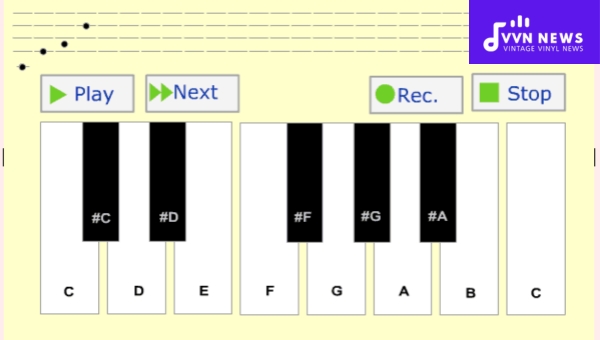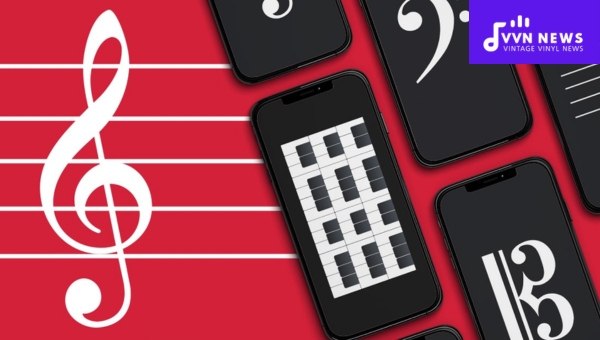Learning music has never been easier – or more fun – in our digitally connected age. Imagine the excitement when lessons don’t just involve theory and practice, but engaging online games too!
This concept takes us straight to today’s topic – the ultimate list of online music games for teaching.
As a parent or teacher, you are continually looking for fresh and interactive ways to stimulate your students or children’s learning patterns.
Thankfully, several education-focused game developers have taken due notice of this need.
My aim here is to guide you through some of the most enjoyable online music games perfect for teaching – a realm where education blends seamlessly with recreation.
Ultimate List of Online Music Games For Teaching
If you’re committed to bringing a world of rhythm and melody to your teaching career or are just curious about the boundaries of music education in today’s digital age, then this list is made for your needs.

Incredibox
Incredibox is a music game that lets you create your music with the help of a motley crew of beatboxers.
Aimed at kids aged 8 and older, it allows users to drag and drop different icons onto various characters to make them produce specific sounds.
Each character contributes unique beats, effects, melodies, or voices. These can be mixed and matched to create a soundtrack that’s entirely your own.
Students not only have fun; they learn about rhythm and composition as well.
Music Tech Teacher
Music Tech Teacher is a treasure trove of quizzes, games, worksheets, and much more for both teachers and students alike.
This website offers a diverse range of interactive activities designed around musical notes, terms, instruments, composers – almost every facet of music education.
From simple classics like ‘Music Soccer’ or ‘Treble Clef Note Names’, this game suite promises engaging fun that complements standard music classes very well.
Also Read: E Major: Scale And Chords [Exciting Sounds For Your Compositions]
Audiotool
Audiotool is an online music production studio perfect for older students interested in composing their original melodies.
Turn any browser into an exhaustive music studio offering everything from synthesizers to drum machines — all packed neatly into an intuitive digital audio workstation (DAW).
It is equipped with cloud storage features to power experiments without constraints of space or time.
One can mix different sounds on adjustable timelines and learn about sophisticated aspects such as modulation frequencies or mixer concepts through hands-on practice.
Creating Music
Creating Music leans more towards young learners (ages 4-9) with its colorful interface filled with straightforward games that teach fundamental musical concepts.
The website offers an introduction to musical notation, creativity, listening, and sheer exploration.
Activities like ‘Morton Subotnik’s Playing Music help children comprehend basic music concepts in an enjoyable and captivating environment.
Major Key Signatures
Major Key Signatures can be a tricky concept for learners. The online tool Fosforito’s Scale and Mode Game makes this subject much more approachable.
It provides the digital interface to create and hear different scales or modes, using either keyboard or string format.
You can explore major (as well as minor) key signatures, hence adding depth to your grasp of scales and modes.
Music Games
Online music games can range from rhythm-based games, and memory-based games, to those that teach instrumentation.
Websites such as Classics for Kids offer games like ‘Spin Magic Mixer’ that allow its users to recreate famous classics like Beethoven’s 5th Symphony while adding their twist.
More advanced learners might prefer platforms such as Soundslice, where they can practice playing songs by following along with transcribed versions in real time.
Also Read: F Sharp Major Triad [Enhance Your Musical Compositions]
Music Theory
For the more serious music enthusiasts seeking a comprehensive knowledge of music theory, an excellent place to start is Teoria’s Music Theory Web.
Rich with interactive exercises and articles, this online resource provides a solid foundation in elements including chord construction, intervals, scales, and harmonic functions.
Teoria’s tutorials cater to novices as well as advanced learners, thus ensuring everyone has something valuable to take away.
Orchestra Instrument Family
An orchestra has multiple instrument families that each contribute unique sonorities.
To help young beginners distinguish these sounds, the game “Orchestra String Family Match” at Quia.com is an engaging choice.
It tests recognition skills by asking players to match specific instruments with their correct family.
This allows learners to familiarize themselves with the tone and pitch of different instruments.
Another excellent resource is the New York Philharmonic Kidzone where students can navigate through an interactive orchestra to learn about different instruments.
Orchestra Jigsaw
Introducing students to an orchestra often involves learning about the layout of its various elements.
The “Orchestra Jigsaw game” at Carnegie Hall’s Listening Adventures site provides a hands-on experience for this task.
Here, players complete jigsaw puzzles representing different orchestral groups.
Once finished, each section comes to life with facts about their instruments and sound snippets.
This innovative approach stimulates visual as well as auditory synthesis, aiding deep comprehension for beginners.
Rhythm Capture
Rhythm Capture is a distinctive training tool that emphasizes improving players’ rhythmic reading and dictation abilities.
It provides several rhythms of differing complexities, enabling the comprehension and performance of patterns better.
Players are engaged with tunes played on different musical instruments – the goal is to match each rhythm accurately following the beats in a given time frame.
Thresholds scale progressively as you transverse through levels, thereby ensuring constant progress in gameplay and learning alike.
The design suits beginners and intermediate-level learners, effectively shaping rhythm perception without any tedious drills.
GoNoodle
One look at GoNoodle ensures you can’t miss its colorful and fun-packed first impression– perfect for children’s engagement!
With hundreds of videos encouraging kids to stay active physically and via thought challenges, the platform caters to several developmental aspects.
While it’s not a ‘music game’ per se, many GoNoodle activities involve movement with music interspersed.
I rate it worth mentioning because when children keep time with the music while following instructions from songs or music-based games therein, they’re essentially learning rhythm in a joyful mode.
Multiplayer Piano
The Multiplayer Piano unveils an exciting twist to piano instruction – real-time collaboration!
You see multiple keyboards displayed on your device screen connected by an internet bridge spanning across continents; play ‘realtime’ piano alongside anyone from anywhere across the globe!
There’s no winning or losing involved, only cooperative exchanges based on skill level ranging from beginners to accomplished musicians.
You can play pre-loaded compositions or own creations freely – all while experiencing the enthralling football-huddle-like spirit that spurs everyone to push their musical limits collectively.
Musicca
Sleek and straightforward, Musicca manages to cover an extensive curriculum using minimal aesthetics.
The platform’s user-friendly design offers games and exercises divided into categories like rhythm, notes, scales, or cords.
It caters to varying levels – from novices just starting with music notes to pros looking for more advanced harmonic ear training.
The notable feature? Musicca comes ad-free – which means an undisturbed focus on training sessions.
Name The Note
Perfect for beginners, Name the Note aids in familiarizing students with staff notation.
Presented like a quiz, you’re given a note on the staff, and your task would be naming it right.
This game’s beauty lay in its simplicity, supplying endless repetitions of random notes ensuring improvement in speed and procurement of correct note names over time.
Your finishing score testifies to your progression through each round of gameplay!
Also Read: How To Transpose Music? [Simplifying Key Changes In Songs]
Theremin
Theremin is an online game in its simplest form, enabling users to create music through mouse movements or touch (on tablets and smartphones).
You move your cursor up and down to control the pitch while moving it left or right controls the volume.
Theremin guides students toward mastering pitch control and the fine art of modulation, freeing oneself from formal musical notation’s constraints.
Despite its simplicity, this online tool can prove a valuable resource in a comprehensive music curriculum.
Virtual Drum
Want to beat some drums but don’t have an actual drum set? Enter Virtual Drum, an innovative application that enables music enthusiasts to play the drums online!
Offered in both 2D and 3D versions, it facilitates teaching and learning drum beats by simulating a real-life drum set experience.
It features various interactive characteristics like different drumstick modes, cymbals adjustment, basing tonality changes on touch position, etc. It enhances rhythm training while saving both time and space.
Music Memory
Memory games are always fun for students. They become even more appealing when they help you learn something worthwhile – as Music Memory does with basic musical concepts!

This challenging online game is designed around the simple goal of matching sounds together while improving attention span and enhancing memory skills.
In Music Memory, you will flip cards to reveal instruments producing distinct melodies when clicked upon.
The challenge is to find matching pairs by recalling where each instrument’s sound was previously heard from – engaging both auditory and spatial skills in a delightful mix.
Music Learning Community
If your goal is to find one platform that combines multiple aspects of music education – look no further than Music Learning Community.
It is a subscription-based platform offering plenty of games that teach different music concepts.
With games suitable for learners ranging from beginners to advanced, the comprehensive library guarantees interactive learning experiences that progressively become more challenging.
With hundreds of interactive games, students can learn fundamental elements like rhythm, note recognition, intervals, scales, and much more under a single accessible umbrella.
PBS Music Games
Trusted by educators for decades, the Public Broadcasting Service (PBS), USA’s premier non-profit public broadcasting service, brings some of the best educational content.
The PBS Music Games constitutes innovative and engagingly designed activities aiming to introduce young learners to various musical aspects: beats, cycles, rhythms, etc.
With popular PBS characters adorning their gaming landscape, the charm is undeniably magnetic for students between ages 4 and 11.
From games like ‘Pinkalicious Dance game’, where you create an original dance video using different dance moves and then watch Pinkalicious carry out your excellent choreographic actions – to ‘Sound Box Symphony’, where you fashion musical compositions using sound boxes across various backdrops – PBS Music Games promise hours of fun-infused learning journeys!
Chrome Music Lab
Chrome Music Lab is a fun and interactive way to teach children the fundamentals of music.
It’s an online space where kids can explore, experiment, and learn about music through hands-on experiments.
The lab provides many tools such as a song maker, rhythm generator, harmonics, chords, arpeggios, and more.
One noteworthy feature is the ‘Song Maker’. It has a simple interface with two sets of blocks — one for melody and one for rhythm.
Users can click on these blocks to add musical notes and beats, creating their tunes to share or download.
The site has no login requirement or additional downloads making it an excellent resource for immediate classroom use.
Magic Flute Orchestra Game
A fantastic way to introduce children to classical music and orchestra instruments is the Magic Flute Orchestra Game.
This Java-based game shines a spotlight on Mozart’s original score from ‘The Magic Flute,’ inviting players on an exploratory journey through every orchestral instrument involved.
Each level focuses on a specific instrument group – flute, violin, trombone— as gamers race against time matching sounds with corresponding pictures.
This engaging game is splendid for expanding kids’ knowledge of both instrument recognition and genre familiarity.
Rhythm Randomizer
Teaching rhythm to young musicians doesn’t have to be dull — introducing Rhythm Randomizer.
This handy tool generates random rhythmic patterns for students at any level learning about note values or rhythmic notation.
What makes Rhythm Randomizer stand out is its customizable feature — teachers or students can select specific note values they wish to focus on.
Be it quarter notes or sixteenth notes; this dynamic tool plots out random rhythm patterns accordingly that challenge understanding and improve rhythmic accuracy.
It’s an excellent tool for practice and offers a fresh touch to traditional rhythm learning.
Also Read: A Guide Transposing Into The Alto C [Navigate Music Transposition]
FAQs
What age group are these online music games suitable for?
These games cater to a diverse age range, from young children (4-9 years) to older students interested in music composition.
Do I need to download software to use these games?
Most of these online music games are accessible directly in your web browser, with no need for downloading extra software.
Can these games be integrated into a standard music curriculum?
Yes, many of these games are designed to complement and enhance traditional music education programs.
Are there any multiplayer online music games for collaborative learning?
Games like the Multiplayer Piano offer opportunities for students to learn and play together in real-time.
Do any of these online music game resources come with instructional guides or teacher support materials?
Websites such as Music Tech Teacher often provide additional teaching materials and guides alongside their musical games.
Also Read: How To Transpose Bass Clef To Treble Clef [A How-To Guide]
Conclusion
When it comes to teaching music, online games provide an interactive and fun approach.
Games such as Incredibox, Music Tech Teacher, Audiotool, and Creating Music all offer unique ways for students of various ages to engage with music.
That’s what makes this ultimate list of online music games a comprehensive guide to revolutionizing music lessons.
These online resources not only expose your students to the world of music but also allow them to appreciate and understand its many facets engagingly and interactively.
